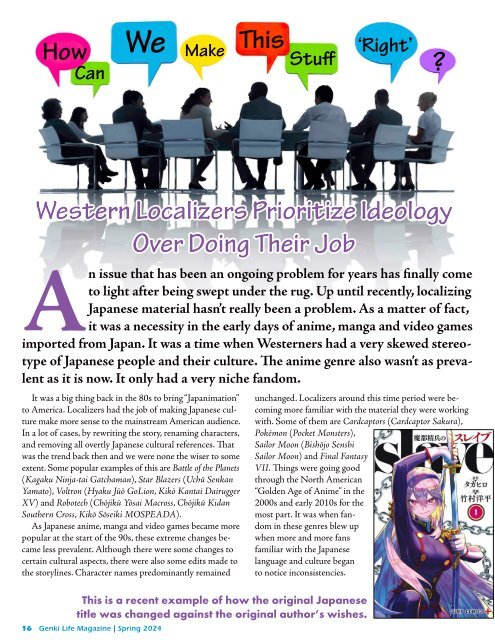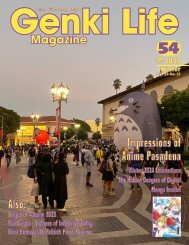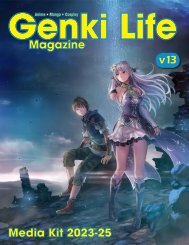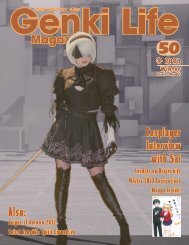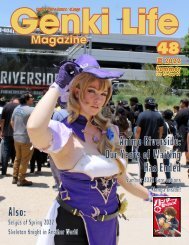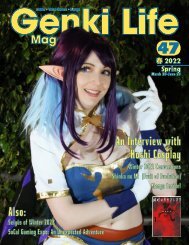Genki Life Magazine 55 - Spring 2024
How Can We Make This Stuff Right?: Western Localizers Prioritize Ideology Over Doing Their Job Isekai de Cheat Skill o Te ni Shita Ore wa, Genjitsu Sekai o mo Musō Suru: Level Up wa Jinsei o Kaeta An Interview with Cosplayer OCD_Usagi Wield VR OneStock PlayStation Game Gremlins Strike Again
How Can We Make This Stuff Right?: Western Localizers Prioritize Ideology Over Doing Their Job
Isekai de Cheat Skill o Te ni Shita Ore wa, Genjitsu Sekai o mo Musō Suru: Level Up wa Jinsei o Kaeta
An Interview with Cosplayer OCD_Usagi
Wield VR OneStock
PlayStation Game Gremlins Strike Again
You also want an ePaper? Increase the reach of your titles
YUMPU automatically turns print PDFs into web optimized ePapers that Google loves.
We<br />
This<br />
How Make<br />
‘Right’<br />
Stuff<br />
Can<br />
?<br />
Western Localizers Prioritize Ideology<br />
Over Doing Their Job<br />
An issue that has been an ongoing problem for years has finally come<br />
to light after being swept under the rug. Up until recently, localizing<br />
Japanese material hasn’t really been a problem. As a matter of fact,<br />
it was a necessity in the early days of anime, manga and video games<br />
imported from Japan. It was a time when Westerners had a very skewed stereotype<br />
of Japanese people and their culture. The anime genre also wasn’t as prevalent<br />
as it is now. It only had a very niche fandom.<br />
It was a big thing back in the 80s to bring “Japanimation”<br />
to America. Localizers had the job of making Japanese culture<br />
make more sense to the mainstream American audience.<br />
In a lot of cases, by rewriting the story, renaming characters,<br />
and removing all overtly Japanese cultural references. That<br />
was the trend back then and we were none the wiser to some<br />
extent. Some popular examples of this are Battle of the Planets<br />
(Kagaku Ninja-tai Gatchaman), Star Blazers (Uchū Senkan<br />
Yamato), Voltron (Hyaku Jūō GoLion, Kikō Kantai Dairugger<br />
XV) and Robotech (Chōjikū Yōsai Macross, Chōjikū Kidan<br />
Southern Cross, Kikō Sōseiki MOSPEADA).<br />
As Japanese anime, manga and video games became more<br />
popular at the start of the 90s, these extreme changes became<br />
less prevalent. Although there were some changes to<br />
certain cultural aspects, there were also some edits made to<br />
the storylines. Character names predominantly remained<br />
unchanged. Localizers around this time period were becoming<br />
more familiar with the material they were working<br />
with. Some of them are Cardcaptors (Cardcaptor Sakura),<br />
Pokémon (Pocket Monsters),<br />
Sailor Moon (Bishōjo Senshi<br />
Sailor Moon) and Final Fantasy<br />
VII. Things were going good<br />
through the North American<br />
“Golden Age of Anime” in the<br />
2000s and early 2010s for the<br />
most part. It was when fandom<br />
in these genres blew up<br />
when more and more fans<br />
familiar with the Japanese<br />
language and culture began<br />
to notice inconsistencies.<br />
16<br />
This is a recent example of how the original Japanese<br />
title was changed against the original author’s wishes.<br />
<strong>Genki</strong> <strong>Life</strong> <strong>Magazine</strong> | <strong>Spring</strong> <strong>2024</strong>


